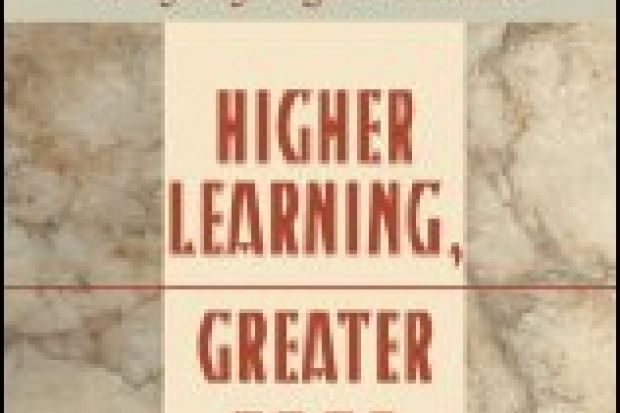We have underinvested in higher education, Walter McMahon argues, because we have underestimated its benefits both to individual students and to society as a whole, as graduates use the human capital formed during higher education throughout their lives in ways that improve the community.
These "additional" perks comprise private, non-market benefits (to individuals over and above their extra earnings) and social boons (externalities). The former include benefits such as better health, longer life and greater happiness. The latter include aspects such as higher education's contribution to democracy and human rights, reduced economic inequality and lower welfare, medical and prison costs. Research is also included, not only the benefits of new knowledge but also its embodiment in the educational products of universities.
All this, in turn, benefits wider society as technologically advanced individuals are employed and absorbed into it - a strong argument for the integration of research and teaching, at least at the postgraduate level.
According to McMahon's analysis, the value of higher education's private, non-market benefits is about 122 per cent or more of the financial ones, ie, the non-market benefits are some 20 per cent greater than the value of additional earnings. The social benefits comprise 52 per cent of all higher education benefits. Together, these justify both increased private and public investment, while the 52 per cent figure provides useful guidance for the appropriate balance of public and private funding (in the US, 53 per cent of direct costs are already borne privately).
Without this higher investment, the skills deficit that is holding the US back will worsen, McMahon says, as will the growing wage differentials between college and high-school graduates. Both are contributing to wider social inequality that, in turn, is having a negative impact on social cohesion.
We have also overestimated the importance of instructional costs because the other main expense (earnings forgone while students study) has been rising less quickly. The huge increase in the level of tuition charges in the US is due fundamentally to falling state support, which reflects the information failure that is the subject of this book and the cause of the problem in the first place. Falling government support has led to reduced access and made affordability more difficult even for those who can get to college.
McMahon's solution for America's problems is to improve information about wider benefits and costs; increase need-based aid by hiking the value of Pell grants (both absolutely and as a proportion of total college costs); provide matching federal support for state appropriations to institutions; aim for a 20 per cent increase in enrolments; and support moves to make the funding of primary- and secondary-school education less dependent on local property taxes.
The additional information would cost very little, while the investment would more than pay for itself over time through increased tax receipts and savings in health, public-assistance and criminal-justice costs.
While McMahon claims that the book is written for non-economists, this non-economist found his economic arguments hard to follow in places. However, he discusses at length the views with which he disagrees, while the reasoning in favour of his argument is set out at enormous length and in great detail.
Although the book is quite repetitive, it is, nevertheless, an important contribution that not only provides a diagnosis of the main problems facing US higher education but also offers some solutions.
Since we are marching in the American direction as far as the financing of our higher education systems is concerned, this US-focused book has a much wider relevance. It should be read by everyone concerned about the marketisation of higher education and its wider social impact.
Higher Learning, Greater Good: The Private and Social Benefits of Higher Education
By Walter W. McMahon The Johns Hopkins University Press 432pp, £24.00 ISBN 9780801890536 Published 24 March 2009
Register to continue
Why register?
- Registration is free and only takes a moment
- Once registered, you can read 3 articles a month
- Sign up for our newsletter
Subscribe
Or subscribe for unlimited access to:
- Unlimited access to news, views, insights & reviews
- Digital editions
- Digital access to THE’s university and college rankings analysis
Already registered or a current subscriber?
